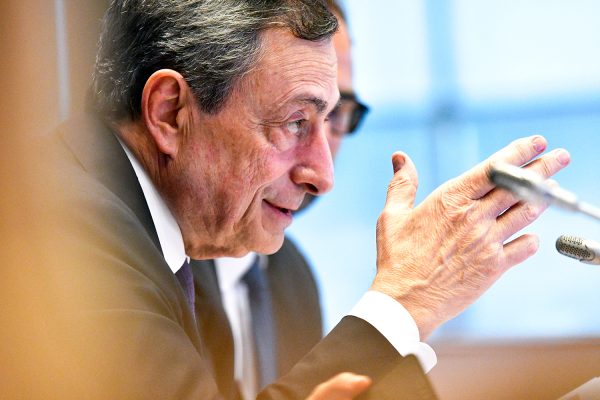
Mario Draghi is on his way out.
The former European Central Bank chief, prime minister of Italy for eighteen months, failed on Thursday to keep his coalition together. The populist-left Five Star Movement and right-wing League and Forza Italia boycotted a confidence vote in parliament.
Draghi’s resignation could trigger an early election in the autumn, which would push passage of the 2023 budget, including measures to help businesses and families cope with inflation, to next year.
It also puts a six-year, €221-billion investment and reform program at risk that’s funded by the EU. (I analyzed the plan here.) Right-wing opponents are polling in first place.
First resignation was rejected
Thursday’s vote caps a tumultuous week for Draghi.
Six days ago, the Five Star Movement, the second party in his coalition, voted against a €26-billion plan to fight inflation. They argued the plan was too small and they opposed its provision for building a garbage incinerator outside Rome.
When Draghi called a confidence vote to essentially browbeat the Five Stars into playing ball, they refused to show up.
The other ruling parties, including the League and Forza, still supported Draghi at the time. But he had said he would only continue with the support of all governing parties.
Draghi tendered his resignation. President Sergio Mattarella rejected it, and told him to try for a confidence vote again.
Establishment rallies around Draghi
Business leaders, trade unions, mayors and universities came out to support Draghi.
So did former prime minister Matteo Renzi, who now leads a small centrist party; former prime minister, and Italy’s current European commissioner, Paolo Gentiloni; the Spanish prime minister, Pedro Sánchez; Britain’s Financial Times, Germany’s Handelsblatt and France’s business daily Les Echos.
Right pulls the plug
Instead of convincing the Five Stars to come around, the drama convinced the League and Forza it was time to pull the plug.
They can read the polls: an election would give the right a majority.
Polling in first place are the Brothers of Italy with 22 to 25 percent support. Formerly of the postfascist fringe, they have benefited from being the only sizable opposition party to Draghi’s “unity” government. The League and Forza are polling at a combined 22 to 25 percent support as well.
Five Stars split in two
The Five Star Movement has split into a governmental wing led by Foreign Minister Luigi Di Maio and a what-the-hell wing led by former prime minister Giuseppe Conte.
Polls suggest the former would be wiped out in an election and the latter may fall to between 9 and 12 percent support, down from 32-33 percent the party as a whole got in 2018.
Those 9-12 percent are the true believers, who think the solution to Italy’s hopeless politics is to blow it all up.
It’s an instinct they share with the Brothers of Italy. Except where Conte would rule the country by online referendum, Giorgia Meloni, the Brothers of Italy leader, would march on Rome.
What to expect of a Meloni government
Draghi spent €16 billion in the last year to help companies and households hit by rising prices. The support was financed by a 25-percent tax on windfall profits.
Additional measures include a one-time cash payment of €200 for Italians with a low income or pension, energy subsidies for vulnerable families, tax credits for businesses and additional funds for local governments. It’s unclear if, and when, those measures will be taken.
More clear is the fate of Draghi’s long-term investments, especially in green energy and sustainability: Meloni voted against them.
Why the EU worries
Eurocrats worry Meloni would join the right-wing government of Poland in arguing national law takes precedence over European law.
That goes against a key principle of European integration: all EU governments must treat all EU citizens the same. What if Italy tried to give preference to native-born Italians in job applications? Or withheld social-security benefits from EU residents? (Marine Le Pen made similar proposals in France, but lost the election in April.)
To their credit, the Brothers have U-turned on Russia. Until February, Meloni was making excuses for Vladimir Putin. Since the expansion of the war in Ukraine, she has taken a clear pro-NATO position.
